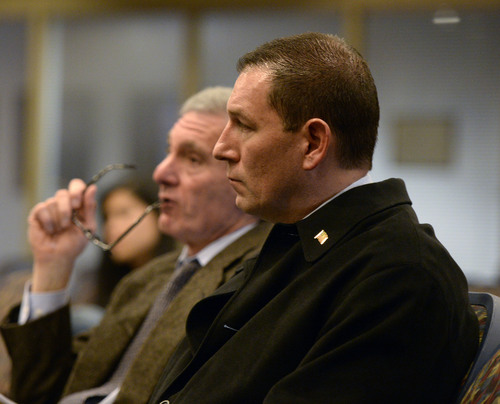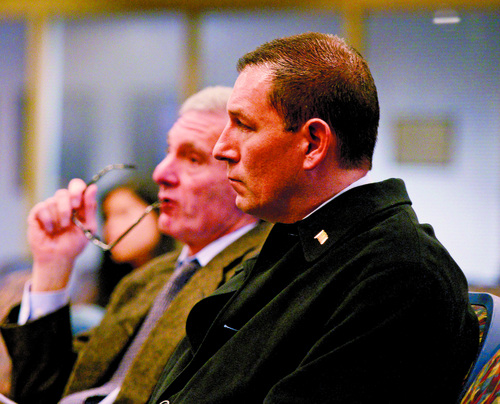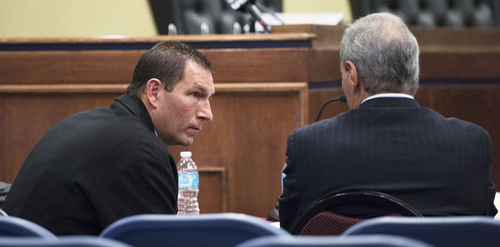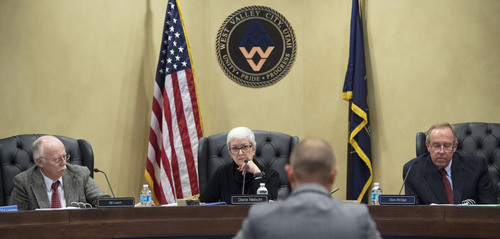This is an archived article that was published on sltrib.com in 2014, and information in the article may be outdated. It is provided only for personal research purposes and may not be reprinted.
West Valley City • Discipline for a demoted officer needed to be strong, send a message and resolve problems for the future.
That was the message Deputy Police Chief Larry Marx conveyed during testimony Tuesday at a Civil Service Commission hearing for the former leader of the discredited — and now-disbanded — Neighborhood Narcotics Unit.
Former police Lt. John Coyle, who was demoted to the rank of officer for his poor leadership of the narcotics unit, is appealing the demotion to the commission.
Testimony in the case concluded Tuesday evening. The commission planned to reconvene Thursday morning to hear closing arguments.
A city-led probe into the narcotics unit unearthed a number of problems, including mishandling of evidence, booking evidence without proper documentation and the possibility of missing drugs and money.
The probe also found that items, such as loose change or a CD in a seized vehicle, were improperly accounted for and that officers kept "trophies" from drug busts for themselves and for use as training aids. As a result of the probe, state and federal prosecutors have tossed more than 120 cases linked to the narcotics unit.
Marx said that during a pre-disciplinary hearing, he did not feel that Coyle grasped the department's concern about mishandled evidence.
City Manager Wayne Pyle testified Coyle was evasive during an internal affairs interview, and it was Pyle's impression that Coyle hadn't taken proper responsibility.
"He seemed to establish a pattern of basically saying, 'I didn't know about it' or 'I wasn't responsible for it' or 'I hadn't read it in policy'... [those] are not indicators of good leadership," Pyle testified.
Erik Strindberg, Coyle's attorney, countered that in the pre-disciplinary hearing, Coyle admitted he had made mistakes, could have done a better job managing his sergeant and accepted responsibility.
But Pyle stuck to his decision to demote Coyle, he said, given the "weight of the documentation" and his impression of Coyle was not taking proper responsibility.
Coyle, who took the witness stand late Tuesday, said he wanted his side of the story heard and "would like to be treated fairly and proportionally."
"I deeply regret that this happened... such a simple [thing] that could have been remedied," he said, when being questioned about allegations that detectives ran each other's evidence to the evidence lockers without documenting the chain of custody. Coyle testified that he was not aware that such a run requires an supplemental report.
Coyle also insisted he was never told to book into evidence the loose change officers found in vehicles that were going up for auction.
He was also under the impression — based on what he'd heard from supervisors previously with the unit and detectives who were currently in it — that they did not file separate use-of-force reports when they only displayed a weapon and had not used it. Strindberg pointed out that Coyle's officers noted use of force in incident reports, so in that sense, they were being documented — and more so than in years past.
In hindsight, Coyle said he would have learned how to audit, established stricter expectations for his sergeant and done a better job verifying what the sergeant was doing.
"I have the ability to be a good supervisor here," Coyle told the commission. "I would want to move forward. That's what I wanted to do was move forward and learn from this."
West Valley City Attorney Eric Bunderson had painted Coyle as an incompetent supervisor, who knowingly let his unit run amok, failed to take responsibility for his actions and had a disregard for the law and police procedures.
But Strindberg told the commission Monday the demotion had "derailed" what had been an extraordinary career and resulted in an estimated $20,000-a-year pay cut.
Coyle was cleared of most allegations during an initial internal affairs investigation and no serious discipline — particularly not a demotion — was recommended. But a second investigation, lasting 11 days, resulted in discipline that led to his demotion, which came last August, a day after new West Valley City Police Chief Lee Russo was hired, testimony revealed.
Strindberg on Monday had questioned what prompted investigators to embark on a second investigation after completing the first, and why Coyle received such harsh discipline when almost none was recommended the first time around.
Strindberg also questioned why Coyle's supervisors were never disciplined and why Sgt. Michael Johnson, who oversaw many of the day-to-day operations of the narcotics unit, received only a 40-hour suspension.
Marx explained Tuesday that the difference was "in level of responsibility and difference in acceptance of responsibility and the understanding he had of the ramifications for the events." Marx added that a lieutenant has a greater accountability than a sergeant.
"All [of] this that had been brought down on the department and officers was preventable," Marx said Tuesday.
The city's probe followed the November 2012 shooting death of 21-year-old Danielle Willard by a member of the narcotics unit — a shooting deemed unjustified by Salt Lake County District Attorney Sim Gill.
Strindberg had planned to call other members of the nine-member narcotics unit, but by Tuesday afternoon, seven of the officers had refused to testify, asserting their Fifth Amendment right against incriminating themselves.
Strindberg had complained Monday that the officers' refusal to testify would make it hard to defend Coyle against the allegations leveled by the city because he would not be able to cross-examine the officers about their internal affairs interviews.
Tribune reporter removed from covering hearing
The Salt Lake Tribune on Tuesday removed reporter Janelle Stecklein from covering a West Valley City Civil Service Commission hearing for demoted police officer John Coyle after the officer's attorney said he planned to call Stecklein as a witness.
Attorney Erik Strindberg told Stecklein he planned to call her to testify in connection with a story she wrote in November about the city turning over the internal affairs statements of officers who were members of the city's narcotics unit to Salt Lake County District Attorney Sim Gill.
Stecklein, who had not been subpoenaed, left the West Valley City municipal building before being directly asked to testify.
Tribune Editor and Publisher Terry Orme said it was necessary to remove Stecklein from the hearing because she had become part of the story.
"A reporter can't participate in an event he or she is covering," Orme said. "We pulled Janelle Stecklein out of that civil service hearing on the advice of our attorney because we wanted to have the right to object to becoming a participant in a story that The Tribune has covered extensively."
The Tribune assigned another reporter to cover the hearing.









